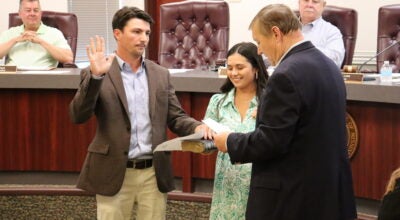PROMISE destigmatizes mental health for farmers
Published 8:28 am Saturday, June 26, 2021
By Erica Hensley
For the MSU Extension Service
Colby Hardin managed his depression since he was diagnosed at 18. With medication, he kept it under control throughout college, while working at Mississippi State University’s dairy farm.
He fell in love with dairy work, and after graduation took a job managing a 300-unit dairy farm at a prison in Arkansas. The stressors of doing this job seven days a week in a high-security setting exacerbated his depression and brought on new symptoms. He started self-medicating with alcohol to help him unwind after long farm days, but soon he needed more and more each day to take the edge off.
Hardin did not get help because he did not know where to go, and nobody — including his family doctor — recognized his symptoms for the mental health crisis they were showing. Through the PROMISE Initiative, PReventing Opioid Misuse In the SouthEast, MSU Extension agents are embarking on “Mental Health First Aid” training across the state, in order to recognize and intervene on the mental health needs of farmers like Hardin. The program teaches agents how to recognize signs of mental health or substance use challenges in farm communities, offer and provide initial help, and guide those in need to professional services.
Today, the 29-year-old is more than two years sober and back at MSU, as assistant dairy herder for the Department of Animal and Dairy Sciences. He says without the support of MSU colleagues and their persistence in getting him psychological help, he would not be here today.
After years of suffering in silence, a colleague finally helped him check into a crisis stabilization unit through Community Counseling Services — a community mental health center that aims to meet people where they are. For Hardin, that meant a one-week inpatient stay to jump-start recovery.
“He was the only one to ask me, What’s wrong? Are you okay?” Hardin said, of his colleague who helped get him into treatment. “It was just me and him in the truck and I broke down and told him, Buddy I’m trying my absolute best, but I need help.”
Through therapy, Hardin would confront living with depression, substance use disorder for alcohol and pills, anxiety and post-traumatic stress disorder (PTSD) from events at the prison farm.
Substance use disorders, or addiction, affect farming families at higher rates than the general population. Most recently, as opioids ravaged the country, three quarters of farm workers have been impacted by opioid use disorder.
Though uncertainty pervades farming, the industry has recently experienced a clash of factors that created a perfect storm. Between commodity price commotion, extreme weather events and COVID-related supply chain squeezes, 2020 pushed some farming communities — already prone to stress — into further chaos.
Three in four farmers say opioids are easily attained, but only a third say the same of mental health or substance use treatment. When Hardin first sought mental health care, his family physician only prescribed him sedatives. “And that was it,” he said. “That was the extent of the help of a severe mental crisis in a rural community. No advice or recommendations for therapy, just pills.”
MSU Extension is stepping in to connect farmers like Hardin to mental health resources before a crisis hits.
“In Colby’s story, there was a friend and colleague who reached out to connect him to care. We want our agents and others to feel equipped to do the same thing — to reach out to those around them who may be struggling,” said David Buys, MSU associate professor.
in ’s Department of Food Science, Nutrition and Health Promotion and MSU Extension state health specialist. “It is difficult to take that first step and ask them if they are OK, but Colby’s story shows just how important and powerful that one question can be.”
During May for Mental Health Awareness Month, nationwide the Farm Bureau Federation worked to destigmatize mental health challenges and substance use disorder, aiming to start conversations and help drive those in need to resources.
Mike McCormick, president of the Mississippi Farm Bureau Federation, says collaboration between Extension and the Farm Bureau is a natural fit. Both are in all 82 Mississippi counties and have a vested interest in helping connect farmers with mental health resources they need, but might not know where to seek them out.
“The farmer suffers in silence a lot because he doesn’t want to open up and show that vulnerability,” he said. “Farm Bureau, along with Mississippi State and other organizations are trying to point people in the right direction and just put out the narrative that you don’t have to suffer in silence.”
Back at the MSU dairy farm, Hardin says he worried disclosing his mental health challenges would come off as weakness and put the job he loves in jeopardy, adding he put off getting help for too long, while his problems worsened, because of it. He now knows the opposite was true — it was colleagues who helped him get and stay clean.
In sharing his story, he hopes to encourage others to come forward to confront their mental health and take steps toward recovery.
“The stigma of the substance abuse and the psychiatric care used to worry me with the people in our farming industry,” he said. “I believe we all fight battles in our own ways and in the rural community I grew up in, it could be perceived as weak to ask for help.”
If you or someone you know is struggling, access the Crisis Text Line 24/7: Text TALK to 741-741 and find more resources from the Farm Bureau here: https://msfb.org/mental-health/.
To learn more about MSU PROMISE, visit: http://extension.msstate.edu/the-promise-initiative.




